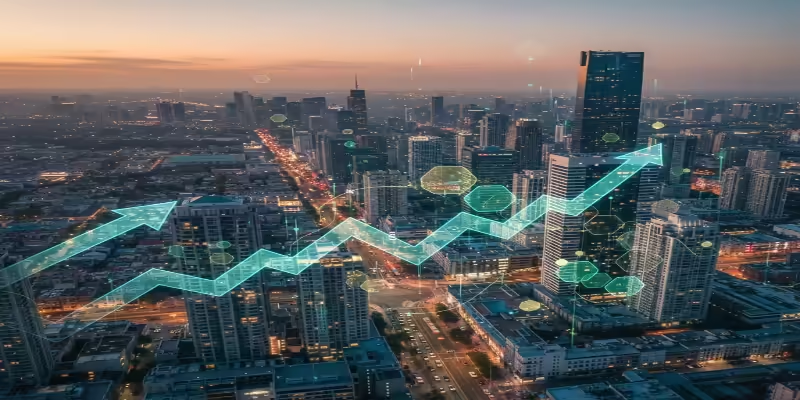Predictive Analytics: Using AI to Forecast Real Estate Prices
Just think if you could forecast property prices the next day as simply as looking at the weather forecast. For a long time, real estate investors, developers, and agents have been dependent on intuition, experience, and market patterns. However, the use of artificial intelligence in real estate has changed the game. It has become feasible to scrutinize an incredibly large volume of data, unearth subtle trends, and even predict future real estate values to a great extent of accuracy, thanks to AI.
This huge step in technolog,y made possible by predictive analytics in the property market is revolutionizing the way real estate professionals perform their tasks. We should understand how AI real estate forecasting functions, its significance, and its implications for investors and homeowners, as well as the industry in general.
The Shift from Guesswork to Data-Driven Precision

Previously property valuation was mostly based on manual assessments of neighbourhood reputation, recent sales, and market intuition. However, the property market has become too complicated for traditional methods to be effective.
The biggest change has been the implementation of predictive analytics in the real estate market. By mining past data, demographic trends, economic indicators, and even social sentiment, predictive models are now able to forecast property prices with much more accuracy and speed.
Such a data-driven method merely lessens the chances of mistakes from the human side; it also allows getting deeper insights that were not accessible before. Thanks to AI’s pattern recognition ability, real estate professionals do not have to “guess” the next market trend anymore; they can actually see it coming.
What Exactly Is Predictive Analytics?

Predictive analytics is the practice of using statistical algorithms, machine learning models, and data mining techniques to indicate the probability of future results. In real estate, it's all about using a combination of thousands of data points to forecast the behaviour of property prices – whether they are going to increase, decrease, or remain unchanged.
The AI models weigh a multitude of factors, for instance:
Historical price data: In fact, one could say a total history of property transactions with an emphasis on the last few years.
Interest rates, GDP, and inflation are examples of economic indicators.
Local market factors include population shifts, the construction of new structures, and the area's growth beyond its current boundaries.
Consumer Behaviour: Online searches, buying sentiment, and demand cycles.
Environmental Factors: Flood zones, pollution levels, and climate risks.
When these factors are fed into machine learning models, they are able to anticipate real estate performance at times even several years in advance.
AI Real Estate Forecasting: How It Works
How about we go over the functioning of AI real estate forecasting one by one:
1. Data Collection
At the very beginning, there is a need to collect data in a big way from diverse sources:
Government property registries
Multiple Listing Services, or MLS
Data on demographics
Trends on social media
Statistics on the economy and employment
Satellite imagery and smart city sensors
Essentially, this move allows one to possess data that is not only structured (for instance, prices and addresses) but also unstructured (for example, customer reviews or social media sentiment).
2.Data Cleaning and Processing
Technology solutions based on artificial intelligence will not be able to deliver the desired results if the fundamental data is not accurate and of good quality. It is about the processes of deleting duplicates, fixing inconsistencies, and standardizing data formats. There are also very sophisticated algorithms that can even figure out missing values and outdated entries by themselves.
3. Machine Learning Modeling
The excitement is here.
AI techniques like regression analysis, neural networks, and deep learning models are employed to find the interaction of the various factors. As an illustration:
How much does the proximity to a metro station influence the value of real estate?
In case of interest rate changes, what is the mechanism by which such changes could make buyers vary their activities by the number of cases, divided into increases or decreases?
What kind of effect do the properties have that are closest to a newly built commercial area?
The programme "absorbs" the examples, and it keeps refreshing itself with the latest information.
4. Price Forecasting and Visualization
Using the model, one can work out real estate prices for certain districts, property kinds, or even specific houses. These predictions are then displayed through, e.g., dashboards, heatmaps, and graphs thus giving the investors and analysts a clear view of the market trends.
Why Predictive Analytics Is a Game-Changer for Real Estate

Predictive analytics is able to deliver something that traditional real estate valuation was never capable of: it provides clarity, accuracy, and it allows for forecasting the future. Therefore, it is changing the rules as follows:
1. Smarter Investment Decisions
Investors can discover properties that are undervalued or have a high potential of development even before other people find out. To put it simply, if AI identifies that a certain neighborhood is going to boom because of new infrastructure projects or increasing demand, the investors who enter the market early can make their moves without losing time.
2. Risk Mitigation
AI is not only about giving locations where prices might increase. It even spots the places where they could drop. With the help of predictive analytics instruments, one can get a grip on the situation when a low demand trend, an increase in building or an economic crisis are about to happen and therefore developers will have a choice to invest with less risk.
3. Enhanced Property Valuation
There are instances when a traditional appraisal can overlook the influence of even minor local factors on a property. However, AI systems are capable of sifting through data even at a very granular level - for instance, the presence of a number of schools nearby, how friendly the area is for pedestrians, or even the amount of noise - thus giving more exact and reasonable evaluations.
4. Personalized Buyer Insights
Predictive analytics is a tool that is very helpful in giving direction to agents and realtors on how to best serve their clients. Using AI, they can learn the kind of homes buyers will most probably like, what range of money they are willing to spend, and which areas will be ideal for their lifestyle.
5. Strategic Urban Planning
Cities are not building themselves; it requires an effort not only from mayors and politicians but also from experts in urban planning and the use of predictive models. Analysing the trends of population growth, lack of habitats, and necessities like roads, they can then come up with plans that are both more intelligent and eco-friendly by optimizing resources and reducing waste.
Applications of Predictive Analytics in the Property Market
AI's power goes much beyond just price forecasting. Here are some of the other ways predictive analytics is used in the property market worldwide:
1. Predicting Market Cycles
Landlords are able to determine the most financially beneficial rental prices in line with the demand, season, and local trends with the use of AI tools; therefore, they can guarantee a stable occupancy rate and a high return on investment.
2. Rental Price Optimization
Using AI tools, landlords can determine the rental prices that will yield them the highest profits in a very easy manner. This can be done by considering the demand, the time of the year, and local trends; therefore, they can guarantee a steady occupancy and a high return on their investment.
3. Identifying Emerging Hotspots
By using predictive analytics, one can identify the future neighbourhoods that are areas with an increasing number of transactions, infrastructure projects, or demographic shifts long before they appear on mainstream radar.
4. Property Flipping and Renovation Analysis
Artificial Intelligence can determine which changes in a property will give the most significant returns by studying the demand and the similar sales in the market if one is a property flipper.
5. Mortgage Risk Assessment
Financial institutions and banks rely on predictive analytics to weigh the risks of borrowers and evaluate the stability of property value. It helps them to be more accurate in loan approvals and cut down on defaults.
Artificial Intelligence in Real Estate: Beyond the Numbers
However, the main change goes beyond technology to the way AI is changing the decisions of people.
In fact, AI is still not a competitor to real estate professionals, but rather a companion. A real estate agent using prediction tools can answer questions of clients more thoroughly. Developers can build on locations that will be more valuable in the future. Homebuyers can take the right course of action if they have the facts rather than making decisions based on their feelings.
Besides that, AI also allows adaptation at any moment in time. The market is always different - the effects of political events, climate change, or a sudden economic crisis can change property trends even at night. Predictive analytics gives the industry the ability to react immediately and change their forecasts accordingly.
Case Study: AI in Action
How about we take a look at an example from the real world?
A PropTech startup in Singapore harnessed AI to sift through more than 20 years of housing data alongside satellite images and transport data to predict property values. Their model was more than 90% accurate in forecasting short-term price changes.
Investors who leveraged this instrument bragged of their returns being higher and losses being lower, as they were the first ones to spot the properties that were undervalued. Similar triumphs are signalling their way into London, Dubai, and San Francisco, where AI-powered platforms are revolutionizing the way agents and investors do their work by providing them with data-driven insights for real estate decisions everyday.
Challenges and Ethical Considerations
Predictive analytics is real estate powered by AI, which is subject to certain limitations.
Data Quality: One of the main reasons for incorrect predictions is data that is not accurate or up to date.
Market Volatility: Besides that, unexpected global crises (such as pandemics or wars) can invalidate even those models that are the best.
Bias in Algorithms:In case the data incorporated in the process is biased i.e., certain communities are left out, which can result in unfair predictions or price discrimination.
Privacy Concerns: The collection of personal and geolocation data should respect privacy regulations and be performed ethically.
The use of AI in a responsible way implies that one should take into account such aspects as transparency, fairness, and accountability, besides innovation.
The Future of Real Estate Price Prediction
The prospects of real estate price prediction are becoming more intelligent day by day.
By using deep learning, natural language processing, and real-time data feeds, AI models will be able to:
Predict almost immediate market changes.
Combine economic indicators at the global and local levels without any disruption.
Create forecasts for buyers, sellers, and investors that are specific to each individual.
What if your AI assistant could be able to tell you about such a world?
"The worth of this property is expected to go up by 12% in the next two years because of new metro connectivity and demographic growth."
This is the strength of predictive analytics – a process of making it clear when it is not obvious.
Conclusion: A Smarter, More Predictable Future
Property market prediction analytics is changing the whole process of how we comprehend, appraise, and place capital in real estate. With AI real estate forecasting, the real estate agents and other industry professionals can definitely take the right steps that are supported by figures, instead of merely trusting their intuition.
It is possible with the help of AI-powered real estate price prediction models to know the value of a property in the distant future. Besides that, artificial intelligence in real estate can be used to analyze consumer sentiment and economic changes so as to have a clear picture of the market. As a result, the future that is being shaped by AI is one where all the stakeholders, consumers, city planners, and so on, will be able to take the right steps without having any doubt.
The time when decisions were made only after observing the real estate situation is about to pass. By the use of predictive analytics, the industry is thus becoming proactive, intelligent, and data-driven not only predicting prices but also possibilities.